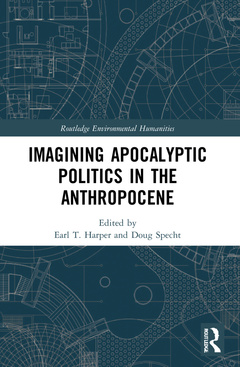Imagining Apocalyptic Politics in the Anthropocene Routledge Environmental Humanities Series

Bringing together scholars from English literature, geography, politics, the arts, environmental humanities and sociology, Imagining Apocalyptic Politics in the Anthropocene contributes to the emerging debate between bodies of thought first incepted by scholars such as Mouffe, Whyte, Kaplan, Hunt, Swyngedouw and Malm about how apocalyptic events, narratives and imaginaries interact with societal and individual agency historically and in the current political moment. Exploring their own empirical and philosophical contexts, the authors examine the forms of political acting found in apocalyptic imaginaries and reflect on what this means for contemporary society. By framing their arguments around either pre-apocalyptic, peri-apocalyptic or post-apocalyptic narratives and events, a timeline emerges throughout the volume which shows the different opportunities for political agency the anthropocenic subject can enact at the various stages of apocalyptic moments.
Featuring a number of creative interventions exclusively produced for the work from artists and fiction writers who engage with the themes of apocalypse, decline, catastrophe and disaster, this innovative book will be of great interest to students and scholars of the politics of climate change, the environmental humanities, literary criticism and eco-criticism.
Introduction: ... these unprecedented timesEarl T. Harper and Doug Specht 1. They say "our house is on fire" – on the climate emergency and (new) Earth politics Edward H. Huijbens and Martin Gren 2. Do not go gentle into that good night: contested narratives and political subjectivities in the Anthropocene Carlos Tornel and Aapo Lunden 3. The end of worlding: indigenous cosmologies in the Anthropocene Mariana Reyes-Carranza 4. Apocalypse repeated: the absence of theindigenous subject in George Turner’s The Sea and Summer (1987) Charlotte Lancaster 5. Apocalyptic Literary Geographies: The Tempest’s ‘brave new world,’ Frankenstein’s ‘modern Prometheus,’ and Cloud-Atlas’ ‘ furthest-eeein’ eye’ Charles Travis 6. A world without bodies: geotrauma and the work of mourning in Jorie Graham's FastPhilip Jones 7. Meaningful life at the end of times: ageism and the duty-to-die in Logan’s RunJames A. Tyner 8. The catastrophic drive Lucas Pohl and Samo Tomšič 9. The self(ie) in the Anthropocene Doug Specht and Cat Snyder 10. Urbicide in the Anthropocene: imagining Miami futures Stephanie Wakefield 11. Triggering the apparitions: spectres of chemical seascapes María Soledad Castro Vargas and Diana Barquero Pérez 12. Study for "Memories of the apocalypse" Carl Christian Olsson 13. Variegated environmental apocalypses: post-politics, the contestatory, and an eco-precariat manifesto for a radical apocalyptics Tristan Sturm and Nicholas Ferris Lustig
Earl T. Harper is an Independent Scholar.
Doug Specht is a Senior Lecturer in the School of Media and Communication at the University of Westminster, UK.
.
Date de parution : 05-2023
15.6x23.4 cm
Date de parution : 09-2021
15.6x23.4 cm
Thèmes d’Imagining Apocalyptic Politics in the Anthropocene :
Mots-clés :
Apocalyptic Imaginaries; Follow; Contemporary Societies; environmental humanities; Apocalyptic Narrative; literary criticism; Apocalyptic Politics; eco-criticism; Climate Change; political agency; Pristine; Logans Run; Cloud Atlas; Environmental Apocalypse; Dense; Museum Of Tomorrow; Apocalyptic Imagination; Atlantic Cod; Face To Face; Safe Operating Space; USA; Falling Sky; Bison; Hold; Climate Emergency; Apocalyptic Discourses; Sea Rise; Davi Kopenawa; Ecological Emergency
